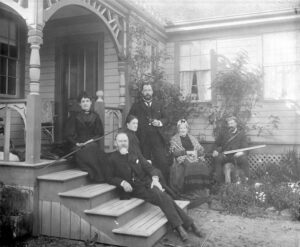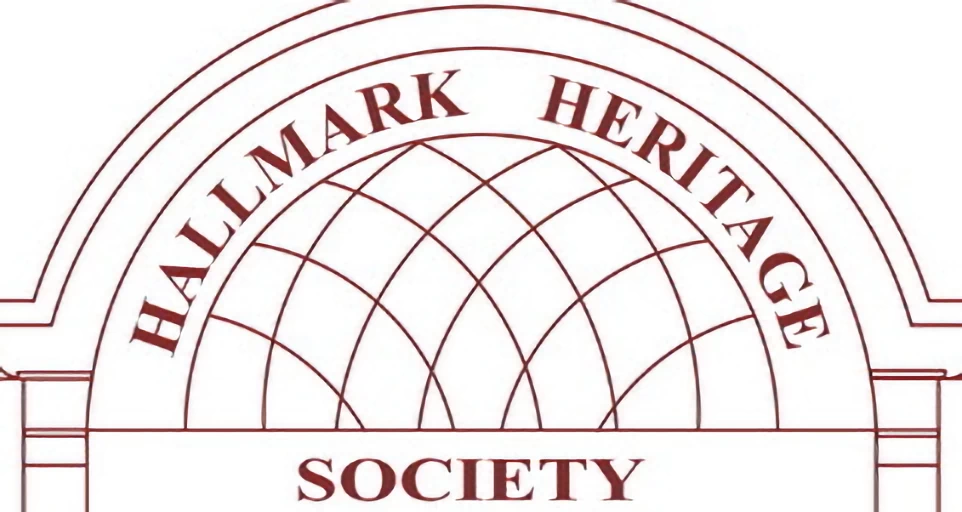The Daily Colonist, May 30, 1948.
Old Homes and Families.
By J. K. Nesbitt

One snow-driven, wind-whipped January day in 1853 the barque Norman Morrison, Capt. Wishart, dropped anchor in Esquimalt after a five month voyage around Cape Horn from England. There were close to 200 eager passengers aboard, coming to settle in a new
land. Among them were Mr. and Mrs. Kenneth McKenzie and their six children – the oldest ten, youngest eight months.
The thirty-year-old mother must have been tired – and relieved, too, that the voyage was over at last. The forty-two-year-old father was probably too busy searching out officials of the Puget’s Sound Agricultural Company, whose servant he was, to pay much attention to his wife and youngsters that day.
Horse and Wagon.
The family came the three miles from Esquimalt by horse and wagon and found a house just outside the fort. Mrs. McKenzie immediately started her housekeeping affairs, while Mr. McKenzie hurried to the head of Victoria Arm and commenced establishment of a farm for his company. He called the place Craigflower, after the English estate of Andrew Colville, deputy governor of the Hudson’s Bay Company. Soon he had his family at Craigflower, living in a small house until the big residents, which stands yet, was ready about 1855. At Craigflower two more sons were born.
Determined to live permanently in the Crown Colony of Vancouver Island, Mr. McKenzie looked around for land to start a sheep station. In 1856 his eyes fell on nearly 1000 acres in the Lake Hill area – rich, rolling acres surrounding Christmas Hill. As far as can be learned today, he built the rambling farm home that is still in use, about 1866 in there – until a few years ago – the members of his family. Today, renovated and altogether delightful, set off by a beautiful old-world garden, with an ancient rose-pink camellia by the front door, live Maj. R. C. Farrow, Comptroller of water rights and Mrs. Ferrow, who have done all they could to see the old house was kept as much like the original as possible, making it at the same time modern in its conveniences and comfortable.
One of the Big Men.
McKenzie was one of the big men of the early days in Victoria. Little was done without his advice, certainly as far as agricultural affairs were concerned. First mention of him in the newspapers was in July, of 1858, when The Gazette ran this advertisement: “For sale – from 20 to 30 pure Southdown rams of English stock, a strong American country horse and several young country horses. Apply to Mr. McKenzie, Craigflower.”
In 1860 he served on the grand jury, with Chief Justice Cameron (brother-in-law of Sir James Douglas) on the bench. The Colonist of November 13 that year listed members of the jury: Edward Green, Alex Watson, Robert Burnaby, Charles Thompson, Thomas Trout, John Cox, Jason Langley, J. R. Stewart, JJ Cochran, Jason Reid, E Wright, Michael Muir, Jason Bell and Kenneth McKenzie, Foreman.
Supply to Navy.
With Craigflower Farm nearing completion, McKenzie went into the baking business and soon had contracts to supply ships of Queen Victoria’s fleet, based in Esquimalt Harbour. There was evidently much talk that he had some kind of political pull, for The Colonist of September 5, 1861 had this to say: “we learn that the contract for supplying the fleet with bread was on Saturday last awarded to Kenneth McKenzie, Esq., of Craigflower, for the term of two years at 7 ½ cents per pound. The bakers of Victoria complained of the contract was not opened to competition – that they have not been fairly dealt with by the admiral. We are inclined to think there must be some mistake. The contract for the time, and at the figure awarded, will prove a fortune to the possessor, and we cannot believe that Admiral Maitland would award so important a contract without first affording all a chance to compete for it. The report as we stated, however, is being circulated, and, if untrue, should at once be contradicted by those whom it affects.”
There was no contradiction. Adm. Maitland and Mr. McKenzie held their silence. From time to time Mr. McKenzie’s contracts with the Royal Navy were criticized. Mostly, it seems today, McKenzie ignored the criticism, but March 24, 1869, he wrote to the editor of The Colonist: “In reply to a letter signed “Fair Play” – in The British Columbian, I have to state that for three weeks I advertised for bakers but got no response. Under these circumstances I called on the admiral and he kindly gave me the assistance of two men, to each of whom I agreed to pay one dollar per diem, with their provision, and not, as stated by the anonymous writer, one shilling per diem, should however, any competent baker offer himself I would gladly assist the workingmen of this Colony and so dispense with private labor.”
Farm at Lake Hill.
McKenzie was an active farmer at Lake Hill. His diary show he kept the detailed list of the vegetables he grew, their amounts in the prices he received for them. He had nearly 10 years at Lake Hill, busy with a sheep and cattle and horses. He died April 10, 1874, and The Colonist next day said: “We regret to announce the death at his farm on the Saanich Road of Kenneth McKenzie, Esq. The deceased gentleman had been an invalid for some months. Mr. McKenzie came to Victoria some 23 years ago from Scotland and filled for many years a position of high trust for the Puget’s Sound Agricultural Company at Craigflower, and at the time of his death was proprietor of the Craigflower Bakery and a naval contractor. Mr. McKenzie was universally respected by all classes in his estimable family of the sympathy of the entire community.”
The funeral account: “The attendance was very large. Among those present were His Honor, Lieut. Gov. (Sir Joseph Trutch), several members of the Executive Council and Legislative Assembly, several gentlemen attached to H.M. Fleet, many old neighbors of the deceased and most of our prominent citizens.” Pallbearers were Sir James Douglas, Dr. Tolmie, M. P. P., Jason A. Grahame, Roderick Finlayson, T. L.Stahelschmidt, Jason Lowe, B. W. Pearse and T Dobbin.
Daughters Married.
In 1863 at Craigflower, Jesse McKenzie was married to Alexander Watson, treasurer of the Crown Colony, and later they lived in California. In July 1882, another of the daughters, Dorothea, was married, The Colonist noting “Hyrneneal” – a large number of persons assembled at St. John’s Church to witness the nuptials of T. S. Dobbin, Esq., of Esquimalt, and Miss McKenzie, of Lake Hill. The ceremony was performed by the Rector, Rev. P Jenns, the bridesmaids being Miss McKenzie, sister of the bride; Miss Finlayson, Miss Tolmie, and Miss J. W. Tolmie.
Two of the daughters, Agnes and Wilhelmina Ann Blair, called “Goodie” lived on in the Lake Hill farmhouse with two single brothers, and their mother, who died there July 14, 1897. The unmarried daughters and sons remained in the home, being joined by one of their nephews, Alexander Watson. Agnes died in February 1928, when she was 84, and Wilhelmina died the next year at 76. In 1929 all the fine old furnishings that had come by sailing ship around the Horn were sold at auction, but Alex Watson stayed on in the house until a few years ago. He died last Autumn.
Wilhelmina Mackenzie’s reminiscences, as told to her nephew, are in the Archives. One note says: “Mrs. JS Helmcken took three young girls out to Beacon Hill Park in February, 1853 – Miss Sophie Wishart, daughter of Capt. Wishart, of the Norman Morrison; Agnes and Jesse McKenzie. Mrs. Helmcken sang the Sultan’s Polka and the girls danced on the sod. Miss McKenzie also later added that Jane and Agnes Douglas were also with them. The dance took place where the Burns monument now stands. Dean Cridge started a school for girls on Humboldt Street, near the Reformed Episcopal Church of today. Mrs. Cridge and Miss Mary Cridge, the sister of the Dean, taught, well Miss Lizzie Cridge looked after the house. The girls who attended were Mary Kennedy, Agnes McKenzie, Kate and Cecilia work and two Thorne girls. Only two borders were Miss Kennedy and Agnes McKenzie.”
The McKenzie Sons.
Of the McKenzie sons, little is recalled here now. Andrew and William went to the United States. Robert later married Andrew’s widow and died at Lake Hill shortly after the turn of the century, as did Kenneth, who never married. Kenneth, it seems appeared destined to be in many accidents, according to old newspapers.
The Colonist of August 12, 1876, said “A gun accident of a very painful character took place near Parson’s Bridge – by which Mr. Kenneth McKenzie was severely shot in the breast and about the arms and body. It appears that he was in company with another gentleman, who lost sight of him for a few minutes, and that a bird, suddenly rising between him and his friend, resulted in the discharge of the latter’s gun with the effect mentioned. Mr. McKenzie, who suffered a great deal from his wounds, was at once conveyed to the naval hospital at Esquimalt – the gentleman was so unfortunate as to be the cause of the accident, of course, feels very much distressed.”
In two years later, on August 6, 1878 – “Mr. K McKenzie, of the dockyard, Esquimalt, while writing home along the old road, was thrown violently from his horse and very severely cut about the back of the head and face. Mr. McKenzie was found lying senseless in a pool of blood by two blue jackets and Mr. Innis, Junior., who at once rode into town and summoned Dr. Helmcken, who drove out and sewed up the wounds on the head and pronounced them serious though not dangerous. The injured gentleman was then conveyed to his residence near Swan Lake.”
Original Entrance.
Today Lake Hill Farm is a picturesque link with the past. It’s 14 rooms ramble every which way. It’s front door contains the original massive lock and key, which still work perfectly. It beams are mostly wood; the quaint dining room has a skylight; its timbers are as sound as a day it was built. The floor slope here and there, and many of the windows – there are 34 – are there ripply type of glass that denotes age and perfection. There are remnants of the old barns left and about the whole place is an air of the past – when boys and girls frolicked in the many rooms, before the finely tiled fireplaces, and worked and played in the fields and climbed to the top of Christmas Hill to see what to them must have appeared the whole wide world spread out before them.
